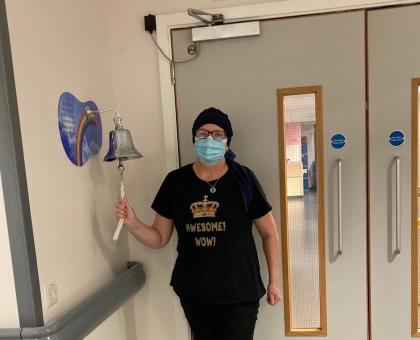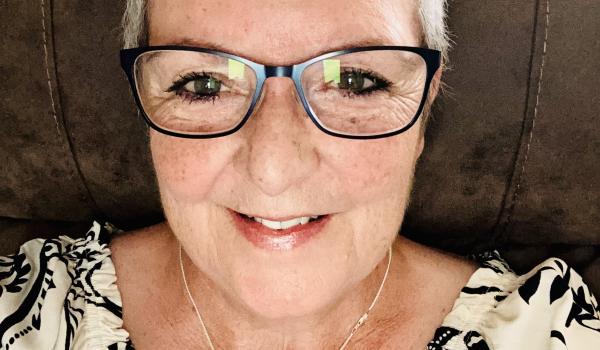Looking back, I had them all really. How do you get to your 60s and not know the symptoms of ovarian cancer?
Multiple diagnoses
I’d been visiting my doctor on and off for about two years before my diagnosis. I was experiencing a few different symptoms - bloating, abdominal pain, needing to go for a wee more, and changes in my bowel habits.
Initially, it was suspected that I had diverticulitis and I had a colonoscopy to confirm. I think I then started putting a lot of things down to that, but none of my symptoms eased. Then I received a diagnosis of irritable bowel syndrome (IBS). Something I now know to be very rarely diagnosed for the first time when you’re over 50.
In July 2021, my stomach swelled to three times its usual size. I was prescribed a laxative drink for five days, but the pain became unbearable. Following a call with 111 I went straight to A&E. I needed help to manage the pain, and I needed answers as to what was going on.
After multiple tests and scans I was informed that I had a cyst – about 30x20x10cm in size. Similar in length to that of a pineapple! It would need to be removed but I had to wait for a Multidisciplinary Team Meeting (MDT) to confirm the best plan.
Originally it was explained that it could be a rare bowel cancer that had formed on the outside of my bowel, but a biopsy then confirmed it was low grade ovarian cancer. A rare form of epithelial ovarian cancer.
I was so confused. Having had a full hysterectomy in 1996 I didn’t have any ovaries – so how could I have ovarian cancer?
It was a complete shock to me. I’d heard about the disease before as I had an aunt who sadly died of it, but it wasn’t something I ever really thought about. Especially since having my hysterectomy procedure.
Finding the positives
I found the Target Ovarian Cancer website quite early on after my diagnosis. I just wanted as much information as I could get. But at the time, being able to search things online was both a blessing and a curse.
With a late-stage diagnosis like mine, you can go two ways really and I’m grateful for having joined the charity’s online community. Listening to other ladies who’d been through it and hearing their positive outlook on everything was so helpful. It was key to keeping me on that path and not veering too far into a more negative headspace.
Getting a treatment plan
At first, I was told that I wouldn’t be able to have an operation due to being stage 4 and the cancer having spread to my liver. I started chemotherapy and had two rounds before being referred to a liver specialist.
I remember it feeling like a positive step, and a plan was put in place so that a liver surgeon and a gynaecological surgeon could work together to try and remove as much of the cancer as possible.
After three more rounds of chemotherapy, in January 2022, I went in for the operation. There were still Covid-19 restrictions in place, so it meant that there were no visitors, and my husband couldn’t come in with me – but I can’t praise my entire team enough for how my care went. Everyone was absolutely brilliant.

Following the operation it was explained that they had removed almost 50% of my liver and all the cancer that they could see. It was great news, and the surgical team were exceptionally pleased with what had been achieved – but at the time it was a lot to process. It had been quite a traumatic experience.
Post surgery I was in intensive care for three days before being moved onto the liver ward and finally discharged home. It had taken its toll on me both physically and mentally.
I had two more rounds of chemotherapy before my treatment plan came to an end and I was placed on Anastrozole. As my cancer had been oestrogen positive, Anastrozole was an option for me as an ongoing hormone treatment – lowering the levels of oestrogen in your body. A more common treatment for low grade ovarian cancer.
This worked for a few months, but I started to develop pain in my joints. Having consulted with my team about it, I am now on a different hormonal drug, Exemestane, which seems to be working for me at the moment.
Processing everything after treatment
When it’s all happening and you’re having regular appointments and chemotherapy sessions, your mind is busy. It’s just one thing after another and there is always something you’ve got to do so you just do it.
After treatment, when the gap between appointments grows to two/three months then you suddenly have all this time. It was a real, ‘what do I do now?’ moment. I couldn’t look to the future as there were too many what ifs. What if I’m not here then, what if the cancer comes back etc.
I was starting to really struggle and reached out to MacMillan who put me in touch with a councillor. He helped me come to terms with what had happened and return to the more positive outlook I’d had during treatment. I could then see how fortunate I’d been and that I had to stop with the what ifs. You just have to live every day as you can – that’s what I do now.
Getting involved and giving back
When Target Ovarian Cancer got in touch about a new stages tool being developed, I was more than happy to help and give my feedback as someone who had gone through the process of looking for information to understand a diagnosis.
There is just so much information online, and I think it’s really important that there is clear, accurate information from a trusted source available for anyone who needs it.
I was also really keen to give back to all the organisations that had supported me and continue to do vital work for people affected by cancer. Fundraising seemed like the best way to help to make sure everyone gets the help that they need.
We held a beer festival in our local area and raised over £5,000 to split between the two hospitals where my treatment took place, Target Ovarian Cancer and Myeloma UK. We’ve also since hosted a black-tie ball that raised £3,000 for Cancer Research UK. I’m so grateful to everyone that attended, got involved, and helped us raise such a wonderful amount.
As well as funds, I know it’s also important to raise awareness of the symptoms of ovarian cancer. They really are symptoms that can be attributed to anything, and I hope that sharing my story helps women to think twice about dismissing them before getting checked.
If you’ve been affected by this story and would like to speak to a specialist nurse, you can call our dedicated support line on 020 7923 5475 or contact us: [email protected]. We're open from 9am until 5pm, Monday to Friday.
If reading this story has helped you, join the Ovarian Cancer Community to connect with more people affected by ovarian cancer: www.targetovariancancer.org.uk/onlinecommunity



